African leaders gather to review progress made in the implementation of the 2001 Abuja Declaration on HIV/AIDS, Tuberculosis and Other Related Infectious Diseases and call for sustainable strategies to advance health towards 2015 and beyond.
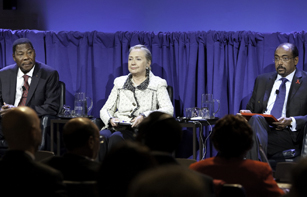
L to R: President of Benin, Yayi Boni, United States Secretary of State Hillary Rodham Clinton and UNAIDS Executive Director Michel Sidibé
Credit: UNAIDS/B.Hamilton
NEW YORK/GENEVA, 26 September 2012— African leaders gathered in New York on the sidelines of the 67th Session of the United Nations General Assembly to discuss the African Union (AU) Roadmap. This initiative outlines long-term sustainable strategies to finance and provide access to HIV treatment and prevention services and other health services in Africa as called for in the Millennium Development Goals.
“Ten years after Abuja, millions of lives have been saved and Africa has prospered,” said President of Benin Boni YAYI, in his capacity as Chairperson of the African Union. “These foundations have to be made permanent for this generation and for all our future generations.” President Boni YAYI presented the African Union’s Roadmap for Shared Responsibility and Global Solidarity for AIDS, Tuberculosis and Malaria.
Shared responsibility and global solidarity
President Joyce Banda of Malawi embraced the concept of shared responsibility. “I am fully committed to mobilizing additional domestic resources while ensuring efficient use of external funds,” she said in a statement of support to meeting. President Banda also highlighted her country’s pioneering work to “ensure all HIV positive pregnant women, irrespective of their CD4 count, commence antiretroviral therapy and take HIV treatment for the rest of their lives.”
The transformation of access to health in Africa has come from inspired African leadership coupled with strong international support. Health investments, from funders and domestic resources have expanded manifold in Africa. Weak health systems have been replaced with a greater focus on human resources and ingenuity to provide health care in remote areas.
United States Secretary of State Hillary Rodham Clinton addressed the gathering and recognized the renewed commitment by the African Union to the AIDS response. “If every nation devastated by HIV follows the example of many of the leaders in this room and steps up to shared responsibility, we won’t just keep up our momentum—we will accelerate our progress and move even faster toward the day when we can announce the birth of an AIDS- free generation,” she said.
Towards the 2015 goals and the post 2015 agenda
With three years to go to meet the Millennium Development Goals, as well as the global AIDS targets agreed to in the 2011 United Nations Political Declaration on AIDS, participants echoed the need for strong political leadership and enhanced country ownership.
As a first step, African leaders agreed to accelerate the implementation of the Roadmap on Shared Responsibility and Global Solidarity for AIDS, Tuberculosis and Malaria adopted by the African Union in July 2012.
“Africa has not only shown that it cares but that it has increased its capacity to provide health care for its people. Millions of lives have been saved as investments into healthcare have increased—both domestic and international,” said Michel Sidibé, Executive Director of the Joint United Nations Programme on HIV/AIDS (UNAIDS) who moderated the high-panel debate. “For every African to realize their right to health, a new paradigm of sustainable health services has to be put in place. For this we must secure the investments needed, secure good laws, secure the science, secure shared responsibility and global solidarity as well as secure access to lifesaving health services.”
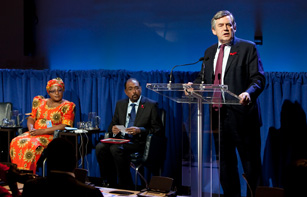
United Nations Special Envoy for Global Education Gordon Brown speaking at the event.
A key to this agreement is advancing a new model of mutual accountability that can help unite African governments and their development partners in a series of practical actions and which will bring Africa closer to ending the AIDS epidemic. Data released this year by UNAIDS shows that scientific advances and improved programme practices have helped to reduce the number of new HIV infections and AIDS-related deaths. Life-saving HIV treatment is now reaching more than 8 million people around the world—more than 6 million of which are in Africa, the region most affected by the epidemic.
“This is the time for Africa to intensify its efforts and create a new international compact against AIDS,” said President Macky Sall of Senegal.
During the dialogue it was agreed that the capacity of AIDS Watch Africa be strengthened. It was also suggested that AIDS Watch Africa, the African body mandated to ensure accountability for action, create a new model of accountability in consultation with Africa’s development partners.
Sustainable and innovative health financing
The leaders, which also included the Presidents of Comoros, Equatorial Guinea and Namibia, the Deputy Prime Minister of Kenya and development partners including France, Sweden, Brazil, the African Union Commission, European Commission and World Bank, also discussed ways to ensure that health financing is adequate and sustained. In recent years many countries in Africa have adopted innovative ways of generating resources for health, beyond traditional means. For example, Rwanda and Uganda now place levies on mobile phone usage with proceeds supporting HIV programmes. Zimbabwe’s AIDS levy now provides about US$ 30 million as the country’s economy expands. Social health insurance is also being explored by many countries.
At the same time domestic investments for health have increased, but the majority of countries have not yet met the Abuja target of allocating 15% of government budget to health. Leaders at the meeting agreed that this goal should be maintained and all efforts be taken to achieve this target. However they also agreed that international investments, which have remained stable in recent years, must be sustained and increased. They also called for new and diversified sources of international investments—especially from countries with emerging economies.
Sustainable access to medicines
A majority of the pharmaceutical needs of Africa are met through imports. The need to boost local capacity to manufacture essential quality-assured medicines as well as developing regional markets for them, including through common regulatory frameworks was highlighted at the event.
“Africa must be a source of knowledge and science, not just needs and wants,” said President Moncef Marzouki of Tunisia. “We will make all efforts to ensure that Africa meets more of its pharmaceutical needs through increased local production.”
Getting to zero
“If every girl and every boy goes to school and is taught about HIV prevention we can reach the global goal of Zero new HIV infections, zero discrimination and zero AIDS-related deaths,” said Gordon Brown, the United Nations Special Envoy for Global Education. “To the UNAIDS vision of Zero if we add zero illiteracy, we can end AIDS faster.”
There are nearly 23.5 million people living with HIV in Africa. New HIV infections in the region have declined by 22% since 2001. By the end of 2011, an estimated 56% of people eligible for HIV treatment in sub-Saharan Africa were accessing it—with treatment coverage increasing by 22% across the region between 2010 and 2011.







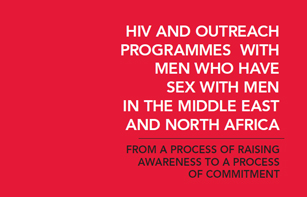



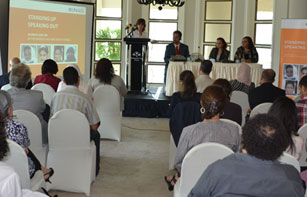

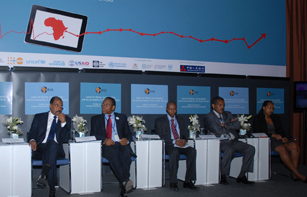
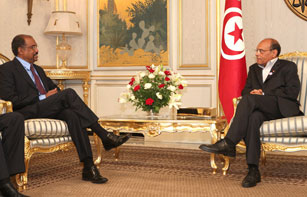

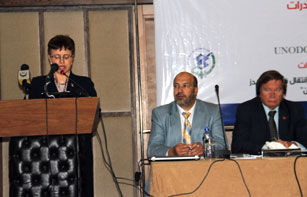 L to R: H.E Dr Fatima Elhamrosh, Libyan Minister of Health, Dr Badereddin Annajar, Director General of the National Center for Disease Control and Olavi Elo, Special Envoy for the UNAIDS Executive Director to Libya.
L to R: H.E Dr Fatima Elhamrosh, Libyan Minister of Health, Dr Badereddin Annajar, Director General of the National Center for Disease Control and Olavi Elo, Special Envoy for the UNAIDS Executive Director to Libya. 